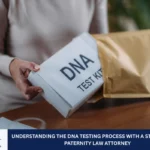If you’re an unmarried parent in Staten Island, New York, and you’re wondering how to establish paternity for your child, a paternity law attorney can guide you through every step. Whether you want your name on the birth certificate, need help with visitation rights, or want to request legal custody, it all starts with establishing paternity.
Let’s break it all down — in simple terms — so you understand your legal rights and how New York law works in paternity cases.
Why Paternity Matters in Staten Island
When a child is born out of wedlock, the father isn’t automatically the legal father, even if he’s biologically related. This can limit his ability to:
- Make medical or legal decisions
- Spend time with his child
- Be listed on the birth certificate
- Request legal custody or visitation rights
Without legal paternity, the child may also miss out on:
- Child support
- A full medical history
- Social Security benefits
- Health insurance
- Inheritance rights
In short, establishing paternity protects everyone involved — and ensures your parental rights are respected under New York State law.
What Does It Mean to Establish Paternity in New York?

In Staten Island, establishing paternity means creating a legal relationship between a father and his child under New York Courts. This gives the father both rights and responsibilities.
Legal fatherhood allows a father to:
- Be listed on the child’s birth certificate
- Request legal and physical custody
- Seek visitation rights
- Make important decisions regarding education, religion, and healthcare
It also opens the door to child support enforcement through a formal support order under the Child Support Standards Act.
Legal Ways to Establish Paternity in Staten Island

There are two legal options for establishing paternity in Staten Island, NY, both recognized by the New York City Family Courts.
1. Voluntary Acknowledgment of Paternity (AOP)
This is the easiest and fastest way — if both parents agree.
- It’s a legal form signed by both parents that says the man is the child’s biological father.
- Often completed at the hospital right after the child’s birth.
- It can also be signed later at the Office of Child Support Services or a Child Support Office.
Once filed with the New York Department of State, the father becomes the child’s legal father and will be added to the birth certificate.
✅ You have 60 days to revoke the Acknowledgment of Paternity. After that, it can only be challenged in Family Court for reasons like fraud, duress, or mistake.
2. Family Court Petition (Order of Filiation)
If there’s any disagreement — or uncertainty — about who the father is, you’ll need a court order.
Here’s how it works:
- One parent (usually the mother) files a paternity petition in Family Court.
- The judge may order a DNA test to confirm biological paternity.
- If results are positive, the court issues an Order of Filiation — legally naming the father.
The Order of Filiation is crucial for fathers who want to request visitation rights, legal custody, or become involved in child custody disputes.
Understanding DNA Testing and the Role It Plays

In paternity cases that aren’t agreed upon, DNA paternity testing is often required by the court.
Here’s what to expect:
- Cheek swab tests (non-invasive)
- 99.9% accuracy
- Results usually come back in 1–2 weeks
- Only State of New York-approved labs can be used for legal purposes
Types of testing:
- Genetic paternity testing (after birth)
- Prenatal paternity testing (rare, but sometimes needed)
Once the DNA tests confirm paternity, the court can proceed with the Order of Filiation, allowing for support orders, visitation rights, and custodial rights.
What Happens After Paternity Is Established?

Establishing paternity isn’t the end — it’s the beginning of legal fatherhood. Here’s what it changes for the father, mother, and child:
1. Father’s Legal Rights
- Can file for legal custody or residential/physical custody
- Can seek visitation rights
- Has a say in the child’s education, healthcare, and religious upbringing
2. Child’s Legal Benefits
- Receives child support
- Gets access to the father’s medical history
- Becomes eligible for health insurance, Social Security, and inheritance
3. Father’s Legal Obligations
- Responsible for financial care, often enforced through a support order
- May need to appear in future Family Court hearings regarding child custody
How a Staten Island Paternity Law Attorney Can Help

While you’re not legally required to hire a paternity lawyer, working with an experienced paternity law attorney in Staten Island can make a huge difference — especially when the situation is complicated.
Here’s how a lawyer can help:
Legal Guidance
- Explain your rights under New York law
- Advise you on how to file a court petition or complete the Acknowledgment of Paternity
- Help you understand legal obligations like child support or custodial rights
Representation in Family Court
- Assist during hearings related to child custody, visitation rights, or support orders
- Fight for your constitutional rights as a parent
- Challenge false claims or file motions to revoke a previous paternity acknowledgment
Protection of Parental Rights
- Ensure your role in your child’s life is legally protected
- Guide you through complex cases involving equitable estoppel, DNA testing, or genetic paternity testing
Having legal support is especially helpful during child custody disputes, DNA paternity testing, or if you’re seeking legal advice on modifying a previous court order.
Special Situations You Should Know

Some paternity cases aren’t straightforward. If you’re facing any of the following, it’s a good idea to consult a paternity lawyer:
1. Mother Refuses to Cooperate
If the mother won’t sign the Acknowledgment of Paternity, you can file a court petition to start the legal process.
2. You Signed an AOP but Have Doubts
If you signed an AOP and now suspect you’re not the father, you have 60 days to revoke it. After that, you’ll need to prove fraud, mistake, or duress in Family Court.
3. The Child Has Another Legal Father
If the child already has a legally recognized father (via marriage or past AOP), you may need to overcome equitable estoppel, where the court prevents disrupting a child’s existing legal relationship.
Local Resources and Contacts in Staten Island

If you’re ready to begin the paternity process in Staten Island, here are key resources you’ll need:
Richmond County Family Court
- File your paternity petition
- Request support orders, visitation rights, or legal custody
- Hearings for Order of Filiation or DNA testing
Child Support Offices (OCSS)
- File for child support enforcement
- Submit or revoke an Acknowledgment of Paternity
State-Approved DNA Testing Labs
- Provide official DNA paternity testing
- Send results directly to the New York Courts
All these offices are accessible by the New York City Subway, and most locations have bilingual support and walk-in hours.
Your Next Step Toward Legal Fatherhood
If you’re ready to be part of your child’s life, don’t wait. Whether it’s helping you file an Acknowledgment of Paternity, preparing for DNA testing, or standing by you in Family Court, a skilled paternity law attorney in Staten Island is your best ally.
Legal fatherhood isn’t just a right — it’s a responsibility. By securing your parental rights, you protect your child’s future and strengthen your bond with them for years to come.
So take that next step — reach out, ask for legal advice, and let the law work for you and your child.
Staten Island Paternity Law Attorney – Soren Law Group

When it comes to protecting your rights as a father, the Soren Law Group is here to help. As a trusted paternity law attorney in Staten Island, New York, we guide you through every step of establishing legal fatherhood — from filing a paternity petition to representing you in Family Court. Whether you’re seeking visitation, child custody, or need help with a paternity test, our team brings the experience and dedication you need. We also assist with child support issues and related legal matters. Don’t wait to take action. Call us today at (718) 815-4500 or fill out our secure contact form to schedule a confidential consultation. We proudly serve Staten Island and surrounding areas.
Frequently Asked Questions (FAQs)
Can I establish paternity without the mother’s consent?
Yes, in Staten Island, you can establish paternity without the mother’s cooperation by filing a petition in Family Court. This is common when one parent does not want to sign an acknowledgement of paternity. If there’s disagreement, the court may schedule a child custody hearing and order a DNA Paternity Test to confirm biological paternity.
Once the paternity test proves a biological connection, the court can issue an order of parentage (also called an Order of Filiation). This legally recognizes you as the father. Afterward, the court can also handle child custody, father’s rights, and child support payments. You do not need the mother’s permission, but it’s highly advised to seek Legal Knowledge or help from a child custody lawyer.
How long do I have to establish paternity in NY?
In New York, you have until the child turns 21 years old to legally establish paternity. This time frame applies whether you’re filing an acknowledgement of paternity or requesting an order of parentage in Family Court. However, the sooner it’s done, the better — especially if you want to secure your father’s rights.
If you’re involved in a child custody hearing or seeking visitation, delays can complicate your case. Also, if you’re attempting to reverse an existing paternity status, the court may apply equitable estoppel, preventing changes if it would harm the child’s physical health or emotional stability. Consult a child custody lawyer to understand your rights and deadlines under family law.
How much does a paternity test cost in Staten Island?
A legal DNA Paternity Test in Staten Island typically costs between $400 and $600, depending on the provider. If ordered by Family Court, the cost may be split between the parents or sometimes waived based on income. These genetic testing procedures must be done through court-approved labs to be valid.
The court requires certified results to proceed with an order of parentage. At-home kits are not accepted in legal cases. A formal paternity test supports decisions related to child support payments, residential or physical custody, and father’s rights. It’s a vital part of the process, and having accurate, court-admissible results ensures your legal standing under family law.
Can I contest paternity after signing the AOP?
Yes, but there are strict timelines. If you signed an acknowledgement of paternity, you have 60 days to contest it. After that, changes are only allowed by Family Court if you prove fraud, duress, or material mistake. This is a serious legal action and usually requires Legal Knowledge and help from a child custody lawyer.
If the court accepts your claim, it may order a genetic testing or DNA Paternity Test to determine biological parentage. If the test disproves paternity, the court can cancel the AOP. This affects not just your legal status, but also child support payments, child care expenses, and father’s rights. It’s a sensitive matter handled carefully under family law.
What rights do I have as an unmarried father after establishing paternity?
Once paternity is legally established through an order of parentage, unmarried fathers gain many rights under family law. These include:
- Seeking residential or physical custody
- Attending child custody hearings
- Requesting visitation schedules
- Participating in decisions about education and physical health
You’ll also have responsibilities, including child care expenses and child support payments, often based on Child Support Calculations set by the court.
If needed, the court can also grant or deny an Order of Protection if safety is a concern. To protect your father’s rights, especially during custody disputes, it’s helpful to work with a child custody lawyer who understands Supreme Court and Family Court procedures in Staten Island.
Do I need a lawyer to establish paternity?
You’re not required to hire a lawyer, but having a child custody lawyer or family law attorney is highly recommended. A qualified attorney can:
- Help you file an acknowledgement of paternity
- Assist during child custody hearings
- Guide you through genetic testing and DNA Paternity Test procedures
- Fight for your father’s rights in court
A paternity test is only one part of a broader legal process. Without proper representation, you risk delays or mistakes in securing residential or physical custody, handling child care expenses, or avoiding errors in Child Support Calculations. Good legal help ensures you protect your legal knowledge and position in Family Court.
Where do I file a paternity petition in Staten Island?
You file a paternity petition at the Richmond County Family Court in Staten Island. This is the appropriate venue for establishing paternity, requesting an order of parentage, or handling child custody hearings and child support payments.
Steps to follow:
- Fill out the petition with identifying information
- Submit any previous acknowledgement of paternity
- Request a paternity test if needed
- Attend all scheduled hearings
The court may also address related matters like residential or physical custody, Order of Protection, and child care expenses. The Child Support Division also works with the court to issue support orders based on official Child Support Calculations. It’s best to consult a child custody lawyer for proper filing guidance.
Can the court order child support once paternity is established?
Yes. Once the court issues an order of parentage, the father becomes legally responsible for child support payments. These are calculated using the Child Support Calculations formula established under New York’s family law.
Here’s what the court considers:
- Each parent’s income
- Child care expenses
- Health insurance coverage
- The child’s physical health needs
Support orders are enforced through the Child Support Division. If necessary, the court can also add conditions like medical coverage or payment for education costs. A child custody lawyer can help ensure fair terms, especially if there are existing child custody hearings or disputes. Once ordered, failing to pay can lead to legal consequences.
Read more Staten Island Paternity Law Attorney: How to Establish Paternity of a Child Born Out of Wedlock











